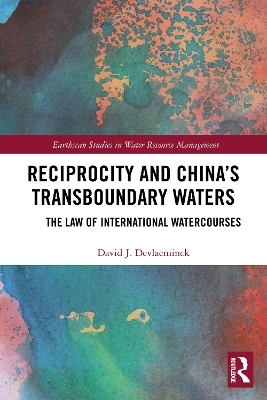
Reciprocity and China’s Transboundary Waters
The Law of International Watercourses
Seiten
2023
Routledge (Verlag)
978-0-367-61597-0 (ISBN)
Routledge (Verlag)
978-0-367-61597-0 (ISBN)
Utilising the principle of reciprocity, Reciprocity and China’s Transboundary Waters: The Law of International Watercourses analyses the law of international watercourses in the past, present and future with a particular focus on China.
Utilizing the principle of reciprocity, Reciprocity and China’s Transboundary Waters: The Law of International Watercourses analyses the past, present and future of the law of international watercourses with a particular focus on China.
As a legal principle, reciprocity plays a strong role in the formation, interpretation and maintenance of international law. Implementing this framework, the book examines the development of the law of international watercourses, highlighting how this basic legal principle is a foundational notion. It applies the framework to China and offers insights into one of the most important transboundary states in Asia. As a primarily upstream state, China is of great significance to its transboundary neighbours; however, there remain significant hurdles, misunderstandings and mistrust between China and its neighbours. China is faced with a complex challenge - how to meet its own development needs while also taking into consideration its primarily downstream neighbours? By focusing on this prominent state this work not only fosters a greater understanding of the law of international watercourses within China, but also clarifies and challenges current perceptions of China’s transboundary water treaty practice. More generally, the book provides a past, present and future view on international watercourse law, starting with an analysis of the UN Watercourses Convention and UNECE Water Convention leading to a discussion of reciprocity’s continued influence as well as charting a path forward.
This book will be of great interest to legal students and scholars with an interest in international watercourses, environmental politics and international law, as well as students and scholars interested in Chinese politics and natural resource management and conflict.
Utilizing the principle of reciprocity, Reciprocity and China’s Transboundary Waters: The Law of International Watercourses analyses the past, present and future of the law of international watercourses with a particular focus on China.
As a legal principle, reciprocity plays a strong role in the formation, interpretation and maintenance of international law. Implementing this framework, the book examines the development of the law of international watercourses, highlighting how this basic legal principle is a foundational notion. It applies the framework to China and offers insights into one of the most important transboundary states in Asia. As a primarily upstream state, China is of great significance to its transboundary neighbours; however, there remain significant hurdles, misunderstandings and mistrust between China and its neighbours. China is faced with a complex challenge - how to meet its own development needs while also taking into consideration its primarily downstream neighbours? By focusing on this prominent state this work not only fosters a greater understanding of the law of international watercourses within China, but also clarifies and challenges current perceptions of China’s transboundary water treaty practice. More generally, the book provides a past, present and future view on international watercourse law, starting with an analysis of the UN Watercourses Convention and UNECE Water Convention leading to a discussion of reciprocity’s continued influence as well as charting a path forward.
This book will be of great interest to legal students and scholars with an interest in international watercourses, environmental politics and international law, as well as students and scholars interested in Chinese politics and natural resource management and conflict.
David J. Devlaeminck is Lecturer at the School of Law, Chongqing University, China.
1. Introduction 2. Reciprocity in China’s Approach to International Law and Transboundary Waters 3. Sovereignty Claims in the Law of International Watercourses 4. Revisiting the Substantive Rules of the Law of International Watercourses 5. The Duty to Cooperate in the Global Water Conventions: Rules of Procedure, Dispute Settlement and Self-Help Mechanisms 6. Observations and Concluding Remarks
| Erscheinungsdatum | 22.12.2022 |
|---|---|
| Reihe/Serie | Earthscan Studies in Water Resource Management |
| Zusatzinfo | 5 Tables, black and white; 1 Halftones, black and white; 1 Illustrations, black and white |
| Verlagsort | London |
| Sprache | englisch |
| Maße | 156 x 234 mm |
| Gewicht | 453 g |
| Themenwelt | Recht / Steuern ► Allgemeines / Lexika |
| Recht / Steuern ► EU / Internationales Recht | |
| Recht / Steuern ► Öffentliches Recht ► Umweltrecht | |
| Sozialwissenschaften ► Politik / Verwaltung | |
| Sozialwissenschaften ► Soziologie ► Spezielle Soziologien | |
| Technik ► Umwelttechnik / Biotechnologie | |
| ISBN-10 | 0-367-61597-5 / 0367615975 |
| ISBN-13 | 978-0-367-61597-0 / 9780367615970 |
| Zustand | Neuware |
| Informationen gemäß Produktsicherheitsverordnung (GPSR) | |
| Haben Sie eine Frage zum Produkt? |
Mehr entdecken
aus dem Bereich
aus dem Bereich
wichtige Gesetze und Verordnungen zum Schutz von Umwelt und Klima
Buch | Softcover (2024)
dtv Verlagsgesellschaft
CHF 30,65
mit Verordnungen, Verpackungsgesetz, Elektro- und …
Buch | Softcover (2024)
dtv Verlagsgesellschaft
CHF 27,85


